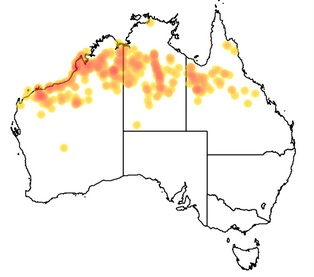Difference between revisions of "Acacia colei"
| Line 9: | Line 9: | ||
== Geographic distribution == | == Geographic distribution == | ||
| − | + | [[File:colei-map.jpg]] | |
| − | [[ | + | |
== Identification == | == Identification == | ||
| Line 30: | Line 29: | ||
== References == | == References == | ||
| + | <references/> | ||
[[Category:Botanicals]] | [[Category:Botanicals]] | ||
Revision as of 06:12, 30 January 2015
| Acacia colei |
|
|---|---|
| DMT (Dr. Karl and abc.net.au 2005) 1%+ in bark (different net reports) |
Contents
General Plant Info
Acacia colei is a perennial bush or tree native to Australia and southern Asia. A common name for it is Cole's Wattle. It grows to a height of up to 9 m. Acacia colei blooms from June through July and the flowers are bright yellow.[1]
Geographic distribution
Identification
Phyllodes are 10-19 cm long and 20-55 mm wide, usually with three prominent longitudinal nerves. A dense covering of short hairs on the phyllodes gives the plant a characteristic silvery-blue appearance.
Alkaloid content
Claimed to contain up to 1.8% DMT in bark[2], 0.2-0.6% in leaf,[3] but others have found no alkaloids, or nearly none in this species[4]
Other uses
Its uses include environmental management, forage and wood.[5] The seeds are good-tasting[6] and are potentially useful as food for humans. The results of tests in Nigeria for the feasibility of raising the tree as a drought-resistant food crop came out very positively.[7]
Extraction
Cultivation
Suppliers
Links
References
- ↑ Australian Biological Resources Study
- ↑ ABC radio, different net reports
- ↑ www.abc.net.au
- ↑ Cite error: Invalid
<ref>tag; no text was provided for refs namedindependent_assay - ↑ Cite error: Invalid
<ref>tag; no text was provided for refs namedILDIS - ↑ ECHO Education Concerns for Hunger Organization
- ↑ World Wide Wattle

